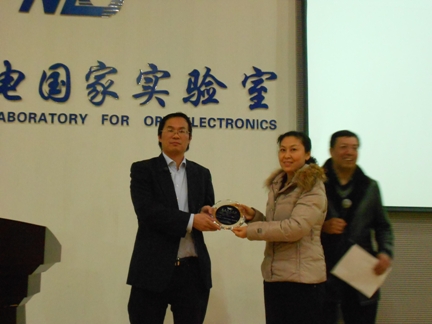Title:Application of stress engineering in nonuniformly polarized optics
Speaker: Prof. Thomas G. Brown
Time:Oct.23. 2012.10:00-11:30
Venue: Room A101 At WNLO
Abstract:
This talk is about the invention of memristor, a postulation given by a mystic philosopher of ancient China 2,500 years ago, Mendeleev’s periodic table of chemical elements, the discovery of the planets in the solar system, the discovery of the "God particle", the supersymmetry in the universe, the hunt for dark mass/energy, and the impact of a proposed supersymmetric triangular periodic table of elementary circuit elements to future computing & EE.
Biography:
Professor Frank Z. Wang is Head of School of Computing, University of Kent, UK. The University of Kent is one of top UK universities and the School of Computing was formally opened by Her Majesty Queen Elizabeth II. Professor Wangs research interests include future computing using memristor, cloud/grid computing, green computing, brain computing and data storage and communication etc. He has been invited to deliver keynote speeches and invited talks to report his research worldwide, for example at Princeton University, Carnegie Mellon University, CERN, Hong Kong University of Sci. & Tech., Tsinghua University (Taiwan), Jawaharlal Nehru University, Aristotle University, and University of Johannesburg. In 2004, he was appointed as Chair & Professor, Director of Centre for Grid Computing at CCHPCF (Cambridge-Cranfield High Performance Computing Facility). CCHPCF is a collaborative research facility in the Universities of Cambridge and Cranfield (with an investment size of £40 million). Prof Wang and his team have won an ACM/IEEE Super Computing finalist award. Prof Wang was elected as the Chairman (UK & Republic of Ireland Chapter) of the IEEE Computer Society in 2005. He is Fellow of British Computer Society. He has served the Irish Government High End Computing Panel for Science Foundation Ireland (SFI) and the UK Government EPSRC e-Science Panel.

